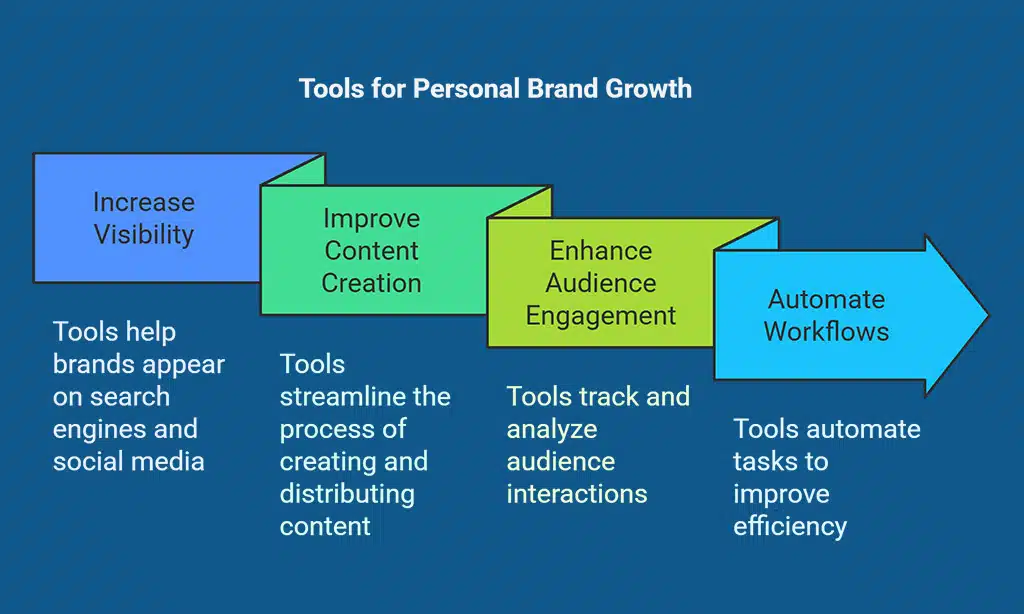In today’s digital world, building a strong personal brand is essential for standing out in a competitive marketplace. Whether you’re an entrepreneur, freelancer, or industry expert, leveraging the right tools can significantly enhance your online presence.
Tools Every Personal Brand Should Use for Online Growth play a crucial role in content creation, audience engagement, SEO, and overall brand management.
This guide will explore the 7 essential tools every personal brand should use for online growth, helping you optimize your strategy, streamline your workflow, and maximize your reach. Let’s dive in!
Why Personal Brands Need the Right Tools for Online Growth?
A strong digital presence is no longer optional—it’s a necessity. The internet is saturated with content, and standing out requires strategic positioning and consistency. Tools Every Personal Brand Should Use for Online Growth help:
- Increase visibility on search engines and social media
- Improve content creation and distribution
- Enhance audience engagement and analytics tracking
- Automate workflows for efficiency
How the Right Tools Enhance Visibility and Authority?
Utilizing the best digital tools allows personal brands to:
- Create high-quality content efficiently
- Engage with audiences effectively
- Optimize search engine rankings
- Build trust and authority in their niche
Now, let’s explore the seven essential tools every personal brand should use for online growth.
The 7 Essential Tools Every Personal Brand Should Use
Choosing the right digital tools is crucial for personal brand growth. The right mix of tools helps individuals build authority, engage effectively with audiences, and streamline content creation. From social media to SEO and analytics, leveraging the best tools ensures long-term success. Here’s a breakdown of the must-have tools for every personal brand.
1. Social Media Management Tools
Social media is a cornerstone of personal branding. To maintain a consistent presence and engage effectively, social media management tools are indispensable. These tools help automate posting, track engagement, and optimize social media strategies.
Best Tools for Social Media Management
| Tool | Features | Pricing |
| Buffer | Post scheduling, analytics, team collaboration | Free & Paid Plans |
| Hootsuite | Multi-platform management, automation, analytics | Free & Paid Plans |
| Later | Instagram-first approach, visual content planning | Free & Paid Plans |
Why Use Them?
- Automate posting and save time
- Analyze engagement and optimize content
- Streamline multi-platform management
- Improve audience engagement through scheduling and insights
2. Website and Portfolio Builders
A personal website acts as your online resume, showcasing your expertise and work. Investing in website and portfolio-building tools is a game-changer for credibility and discoverability. These platforms help professionals create stunning, functional websites with little to no coding skills.
Best Website Builders
| Tool | Features | Pricing |
| WordPress | Best for SEO, highly customizable | Free & Paid Plans |
| Wix | Drag-and-drop simplicity, customizable templates | Free & Paid Plans |
| Squarespace | Elegant designs, built-in analytics | Paid Plans Only |
Key Features to Look For:
- Mobile responsiveness for better accessibility
- SEO optimization to improve search ranking
- Customization flexibility to reflect personal branding
- Integrated blogging and portfolio features
3. Email Marketing and Automation Tools
Email marketing is a direct and effective way to engage your audience and build relationships. Tools Every Personal Brand Should Use for Online Growth should include email automation to streamline communication and nurture leads.
Best Email Marketing Tools
| Tool | Features | Pricing |
| Mailchimp | Email automation, A/B testing, segmentation | Free & Paid Plans |
| ConvertKit | Creator-friendly, automation workflows | Free & Paid Plans |
| Brevo | Affordable email automation, CRM integration | Free & Paid Plans |
Why Use Them?
- Increase audience retention and engagement
- Automate newsletters and promotional emails
- Personalize interactions with segmented campaigns
- Track open rates and optimize email performance
4. SEO and Keyword Research Tools
Search Engine Optimization (SEO) is the backbone of discoverability. Using SEO tools helps you rank higher and attract organic traffic. These tools assist with keyword research, competitor analysis, and content optimization.
Best SEO Tools
| Tool | Features | Pricing |
| Ahrefs | Backlink analysis, keyword research | Paid Plans Only |
| SEMrush | Competitor analysis, on-page SEO | Paid Plans Only |
| Google Keyword Planner | Free keyword research, ad targeting | Free |
Actionable SEO Tips:
- Conduct keyword research to find high-ranking opportunities
- Optimize website and blog content with structured formatting
- Monitor backlinks and domain authority
- Implement internal linking for better SEO performance
5. Content Creation and Design Tools
High-quality visuals and compelling content are non-negotiable for brand success. Content creation tools ensure professional-quality output without needing advanced design skills.
Best Content Creation Tools
| Tool | Features | Pricing |
| Canva | Drag-and-drop design, templates | Free & Paid Plans |
| Adobe Spark | Quick social media content creation | Free & Paid Plans |
| Descript | Audio and video editing with AI-powered features | Paid Plans Only |
How to Maximize Engagement:
- Use eye-catching graphics for social media
- Maintain brand consistency with templates
- Experiment with video content for better reach
- Utilize infographics to improve content shareability
6. Analytics and Performance Tracking Tools
Data-driven decisions are key to success. Analytics tools help track performance and refine strategies for continuous growth. They provide insights into user behavior, engagement, and campaign effectiveness.
Best Analytics Tools
| Tool | Features | Pricing |
| Google Analytics | Website traffic insights, audience behavior | Free |
| Ubersuggest | SEO performance tracking, keyword analysis | Free & Paid Plans |
| Hotjar | Heatmaps, user experience insights | Paid Plans Only |
Why Use Them?
- Identify what works and what doesn’t
- Understand audience behavior
- Optimize website and content for better engagement
- Improve conversion rates with data-driven insights
7. Networking and Collaboration Platforms
Personal branding isn’t just about content—it’s about connections. Networking tools help build valuable industry relationships and create growth opportunities.
Best Platforms for Networking
| Platform | Features |
| Professional networking, thought leadership | |
| Slack | Collaboration and community building |
| Upwork | Showcasing expertise, finding work opportunities |
How to Leverage Networking for Growth:
- Engage with industry leaders on LinkedIn
- Join relevant communities and forums
- Offer value through collaboration and partnerships
- Participate in virtual events and discussions
Wrap Up
Building a personal brand requires a combination of strategic content creation, audience engagement, and data-driven decision-making. To establish a strong digital identity, professionals need to leverage the right set of tools that enhance their workflow, improve audience interaction, and boost visibility.
Tools Every Personal Brand Should Use for Online Growth empower individuals by providing innovative solutions for content marketing, analytics, networking, and SEO. These tools help in automating repetitive tasks, ensuring consistency across platforms, and refining strategies based on data insights, ultimately contributing to long-term brand success.







































